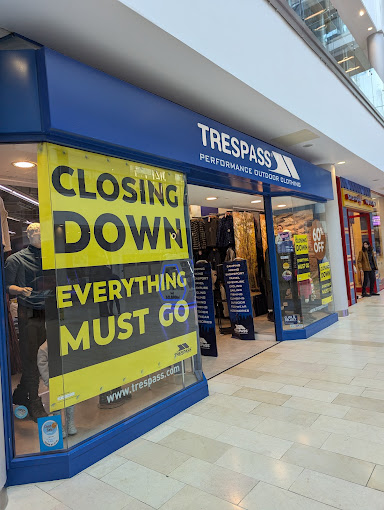Tresspass to Close Leicester Store Amid Nationwide Reductions

An iconic outdoor clothing retailer with over 300 stores across the UK is set to close yet another branch. Shoppers have been flocking to the Tresspass store at Highcross shopping centre in Leicester, eager to take advantage of a major closing-down sale that has been announced. The Leicester location will shut its doors for the final time on March 31, following a significant reduction of up to 60% off selected products, with vibrant yellow and black signs declaring “everything must go” adorning the windows.
While the exact reasons for the closure remain unclear, local speculation has been rife. Some residents have suggested that the closure might be specific to Leicester, while others believe the store has been on a downward trajectory for years. One local commented, “They’ve been having closing down sales for at least 10 years,” while another added, “Far longer than 10 years, I would wager all of their shops have been having closing down sales since they were founded in 1981.”
The outdoor retailer has previously announced the closure of multiple UK outlets, including locations in Norwich and Sutton Coldfield earlier this year. In January, Tresspass confirmed that its Middlesbrough branch would also be shutting down, merely two years after it had opened, which many initially thought was an isolated incident.
Confusion arose as the brand revealed that although several branches were closing, many others would remain operational. Notably, the Norwich store was relocated from Chantry Place to Castle Quarter and reopened in November 2024. Additionally, the Workington branch also moved to another unit in the town center after initially announcing a permanent closure.
Store closures can occur for a variety of reasons, including poor performance of specific branches or the expiration of lease agreements. The overall UK retail industry has been facing significant challenges, and the outlook appears grim. The British Retail Consortium has projected that the Treasury’s increase in employer National Insurance Contributions (NICs) will cost the retail sector approximately £2.3 billion in the coming years.
Moreover, research conducted by the British Chambers of Commerce indicates that more than half of the surveyed companies plan to raise prices by early April. Specifically, a survey of over 4,800 firms revealed that 55% anticipate price increases in the next three months, up from 39% in a similar poll conducted in late 2024. Three-quarters of these companies cited employee-related costs as their primary financial pressure. The Centre for Retail Research (CRR) has also warned that around 17,350 retail sites are expected to close this year, following a challenging 2024 where 13,000 shops shut down permanently, marking a 28% rise compared to the previous year.
Why Are Retailers Closing Stores?
Since the pandemic, retailers have been feeling the strain as consumer spending diminishes due to the ongoing cost of living crisis. High energy costs, combined with a shift towards online shopping, have also taken a toll on many high street shops, leading to their struggles for survival. Additional financial pressures have compounded the difficulties faced by retailers. The British Retail Consortium has warned that the upcoming increase in employer NICs from April will further burden the retail sector, costing it an estimated £2.3 billion.
At the same time, the minimum wage is set to rise to £12.21 per hour from April, with the minimum wage for individuals aged 18-20 increasing to £10, marking a significant rise of £1.40. The CRR has indicated that approximately 17,350 retail sites are projected to close this year. This trend follows a difficult 2024, during which major retailers, including Homebase and Ted Baker, went into administration, leading to the loss of nearly 170,000 retail jobs. The CRR’s year-end analysis indicated that job losses spiked amid the collapse of these significant chains, with a total of 169,395 retail jobs lost in 2024, a 41.9% increase from the previous year.
Experts warn that small high street retailers could face a particularly tough 2025 due to impending tax and wage changes. Professor Joshua Bamfield, director of the CRR, has forecast a bleak outlook for the sector, predicting that as many as 202,000 jobs could be lost in 2025. He stated, “By increasing both the costs of running stores and the costs on each consumer’s household, it is highly likely that we will see retail job losses eclipse the height of the pandemic in 2020.”